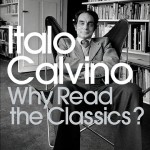译者 ploris
A reader recently wrote me to lightly criticize the fact that I called George Orwell’s Animal Farm and Nineteen Eighty-Four “cult-classics,” suggesting that they instead merit the inferior term “required reading.” So what, exactly, is a classic, and why should we care? Richard J. Smith, in discussing the iconic ancient ChineseBook of Changes, offered a four-point checklist definition and Simon Crtichley showed us how to read them. But perhaps the most essential question is why the classics should be read. That’s exactly what beloved Italian writer Italo Calvino addresses in his 1991 book Why Read the Classics? (public library) — a sort of “classic” in its own right. In this collection of essays on classical literature, Calvino also produces these 14 definitions of a “classic”:
近来一位读者来信表示,对我将乔治·奥威尔的《动物农场》和《一九八四》称作“巅峰的经典之作”(cult-classics)颇有微词,他觉得代用稍低一等的评价——“必读经典”(required reading)更为合适。那么究竟什么是经典?我们为何要关心一部作品是否为经典呢?理查德·史密斯(Richard J. Smith)在讨论中国古代经典著作《易经》时,提出“四点罗列式定义”;西蒙·凯绪利(Simon Crtichley)则告诉我们如何去阅读经典。不过最为本质的问题也许是为什么我们要阅读经典。这恰恰就是备受爱戴的意大利作家卡尔维诺在他1991年写作的《为什么要阅读经典》(Why Read the Classics? )一书中所述的内容——a sort of “classic” in its own right。在这部关于经典文学作品的论文集中,卡尔维诺对“经典”做出以下14个定义:
The classics are those books about which you usually hear people saying: ‘I’m rereading…’, never ‘I’m reading….’
1. 经典就是你常常听人们说“我正在重读……”的那些书,而绝不是“我正在读……”的那些书。
The Classics are those books which constitute a treasured experience for those who have read and loved them; but they remain just as rich an experience for those who reserve the chance to read them for when they are in the best condition to enjoy them.
2. 经典是这样的书籍,它给予已经阅读过或钟爱它们的人们以一种如获珍宝的体会;同时对于保留机会等到阅读的最佳时机来临的读者而言,经典所蕴含的丰富体会也丝毫不减。
The classics are books which exercise a particular influence, both when they imprint themselves on our imagination as unforgettable, and when they hide in the layers of memory disguised as the individual’s or the collective unconscious.
3. 经典之书能带来特别的影响,无论是它们深深铭刻在我们想象之中难以忘却,还是隐隐藏匿于层层记忆之下伪装成个人或集体的无意识。
A classic is a book which with each rereading offers as much of a sense of discovery as the first reading.
4. 经典是每次重读都会带来初读时满满的发现的快意的书。
A classic is a book which even when we read it for the first time gives the sense of rereading something we have read before.
5. 经典是初读却感觉像重读的书。
A classic is a book which has never exhausted all it has to say to its readers.
6. 经典之书对其读者所述永无止尽。
The classics are those books which come to us bearing the aura of previous interpretations, and trailing behind them the traces they have left in the culture or cultures (or just in the languages and customs) through which they have passed.
7. 经典之书带着前人理解的光环来到我们面前,尾随其后的又是他们穿过时光长河在各文化中(或者是不同的语言和风俗)所留下的痕迹。
A classic is a work which constantly generates a pulviscular cloud of critical discourse around it, but which always shakes the particles off.
8. 经典就是能在其周围造就一团批评争议的云雾的作品,然而它却能抖落其中的尘埃。
Classics are books which, the more we think we know them through hearsay, the more original, unexpected, and innovative we find them when we actually read them.
9. 经典是我们道听途说自以为知之甚多,却在真正阅读时发现它们愈加独一无二、出乎意料并且独具创意。
A classic is the term given to any book which comes to represent the whole universe, a book on a par with ancient talismans.
10. 经典之名可赋予那些代表整个宇宙,如同古代附身符一般的书籍。
‘Your’ classic is a book to which you cannot remain indifferent, and which helps you define yourself in relation or even in opposition to it.
11. 你的经典便是你决不能置之不理的书,它帮助你在与它的关系中或反对它的过程中确立你自己。
A classic is a work that comes before other classics; but those who have read other classics first immediately recognize its place in the genealogy of classic works.
12. 经典之作走在其他经典之前,然则读过其他经典的人会立刻认识到它在经典著作谱系中的地位。
A classic is a work which relegates the noise of the present to a background hum, which at the same time the classics cannot exist without.
13. 经典就是将当下的嘈杂之音化作嗡嗡背景声的作品,而这背景声同时也是经典存在所不可或缺的。
A classic is a work which persists as a background noise even when a present that is totally incompatible with it holds sway.
14. 经典是作为时代的背景音而存续的作品——即使处支配地位的当下与之格格不入。
Perhaps most poetic is Calvino’s 11th definition, bespeaking the idea that there is room for subjectivity even in a term as deterministically universal as a “classic,” and offering a witty answer to the nitpicky reader: “‘Your’ classic is a book to which you cannot remain indifferent, and which helps you define yourself in relation or even in opposition to it.”
也许其中最为诗意的是卡尔维诺的第11个定义,意味着:即使是像“经典”这一具有普遍确定性的名词,具有主观色彩的定义仍有一席之地;这句话也给那些挑剔的读者做出了机智的回答:“你的经典便是你决不能置之不理的书,它帮助你在与它的关系中或反对它的过程中确立你自己。”

![]()

本文由自动聚合程序取自网络,内容和观点不代表数字时代立场







.png)

